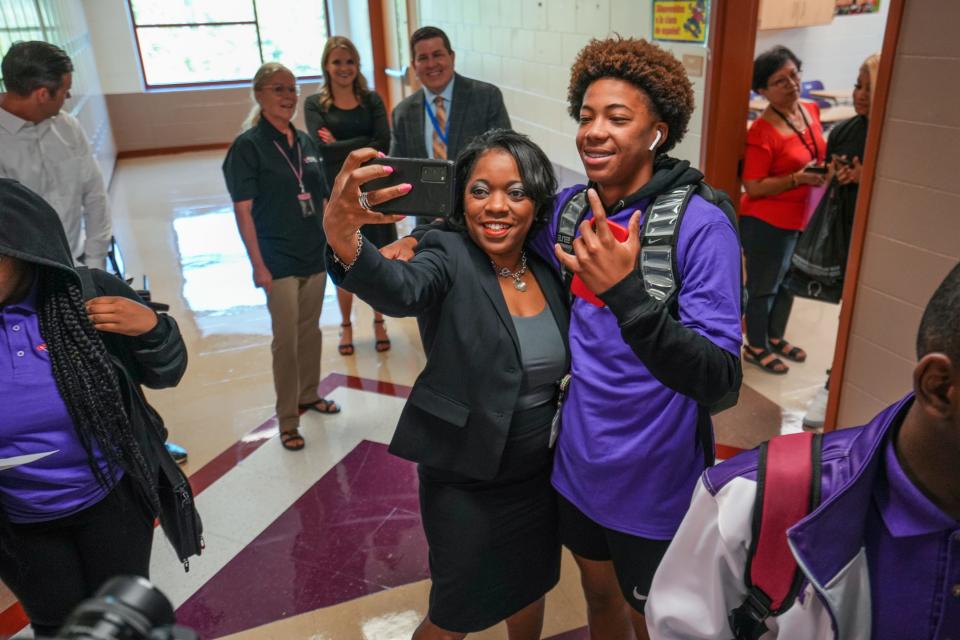CPS superintendent recommends code of conduct changes
A ninth grade student at Shroder High School was beaten unconscious by several of his peers in March. Five days later, the boy's parents and other family members showed up to a Cincinnati Public Schools board of education meeting demanding change.
"Felonious assault is what the arrests were made regarding my son who was on campus for nine days when five gang members beat him unconscious. For me this is completely unacceptable," the boy's mother, Tamara Lanier, said during the spring school board meeting.
This mother says her son was beaten by 5 gang members at Shroder High School because he would not let them copy his biology notes. They beat him unconscious. He was new to the school & had only attended for 9 days at the time of the incident earlier this month. @Enquirer pic.twitter.com/4b0s8BXwdE
— mad mitch (@maddiemitch_) March 21, 2023
She asked the board several questions, including whether they were aware of students being in school who shouldn't have been based on past behavioral issues.
Those students wouldn't have been back at Shroder before the assault, under the updated code of conduct Superintendent Iranetta Wright hopes to implement this fall. Wright presented a revamped code of conduct draft to the school board on Monday that includes several changes, with the goal of making expectations and consequences more clear − for both students and staff. The school board will vote on the changes at the next business meeting in early August.
More: 'Morale is low.' CPS superintendent takes community, board feedback on budget changes
There needs to be consistency across the district, Wright said. A student who makes a code of conduct violation at one school should receive the same consequence they would if they were to make the same infraction in another building.

"That takes a lot of work around alignment," Wright said. "Working with staff, reviewing code of conduct, looking at consequences, reviewing scenarios, so forth and so on."
Students can no longer wait out Promise Center assignments
The students who beat up Lanier's son had been assigned to Cincinnati Public Schools' Promise Center before the incident, Wright said. The Promise Center is the district's alternative to out-of-school suspension and expulsion. It provides additional academic, therapeutic, and behavioral instruction including social and emotional learning lessons and is led by staff trained in restorative practices to help transition students back to their home schools.
But students assigned to the Promise Center aren't really required to show up, Wright said on Monday.
"One of the greatest challenges right now is the vast majority of the students that are assigned to the Promise Center, never attend the Promise Center," Wright said.
The boys who assaulted Lanier's son never went to the Promise Center but reported back to Shroder after their time at the Promise Center was supposed to have concluded.
"The same day or the day after, they assaulted this child," Wright said.
Cincinnati Public Schools: Aiken social worker works with students to curb fighting, truancy
Because of that incident, and to increase general engagement and academic achievement, students assigned for 20 days or more to the Promise Center will now have to attend at least 70% of their assignment before returning to their home school.
"Going to the Promise Center, of course, is a reaction. But our goal is to be proactive around what we can do next to truly, really work to change some of the behaviors that we're seeing," Wright said Monday. "And also make certain that students really understand that this is an additional service for them."
Other code of conduct changes: Dress code violations and emphasis on restorative practices
Wright led the code of conduct revamp over a 16-week review period that included more than 20 feedback sessions with more than 300 participants, including discipline committee members, principals, assistant principals, teachers, students and local school decision making committee members.
The new code of conduct has some updated definitions and clarifies that dress code violations will not result in academic or exclusionary consequences. But dress codes and dress code implementations will continue to be determined at the school level.
Wright also emphasized the use of restorative responses that address a student's emotional well-being, as opposed to punitive responses, to behavior infractions. The code of conduct lists several restorative responses, including but not limited to:
Loss of privileges.
Written reflection.
Create a behavior contract.
Require the student to complete a community service task.
Have the student choose a method of apologizing or making amends to those harmed or offended.
Require daily or weekly check-ins with administrator for a set period of time.
Identify a mentor and establish a schedule of activities related to school performance.
"I do think it's important for us to remind folks that we've been doing this work in our district in a way that a lot of other districts are not and haven't been," board member Brandon Craig said regarding restorative practices.

Those practices are not intended to be the only choices or sequential, Wright said. And they may be paired with other consequences, such as detention, out-of-school suspension or criminal charges in cases where a student has broken the law.
Wright said the most common consequence tends to be sending students to an alternative learning location or the Promise Center to complete their work.
"Really it becomes the responsibility at the school level to determine what's most appropriate based on the action and the recommended consequences," Wright said. "For each of these, the goal is to work with students so that they learn something from their misbehavior."
Board of education will vote on changes in August
Following Wright's Monday presentation, board of education members asked several questions about the new code of conduct draft.
Board member Kareem Moffett suggested getting more feedback from parents before implementing any changes.
Board member Eve Bolton said she's mostly concerned about current underreporting of bullying, assault and "downright meanness" at CPS schools.
"I think part of it is being afraid to report it because you'll get a negative evaluation or you'll look like you're being too strict," Bolton said. "It's across the district."
But generally the board was supportive of the work being done to address student behavior and emphasize restorative practices at CPS.
"I thought it was a great start," board member Mike Moroski said during Monday's meeting. "I'm excited to see where it goes. I feel like we've been talking around and directly about this issue at least since I got here, and I know before that."
The school board will vote to approve the new code of conduct at the next regular school board meeting, scheduled for 5:30 p.m. on Aug. 7 at the Mary A. Ronan Education Center, located at 2651 Burnet Ave.
This article originally appeared on Cincinnati Enquirer: Cincinnati Public Schools updates code of conduct to address behaviors

